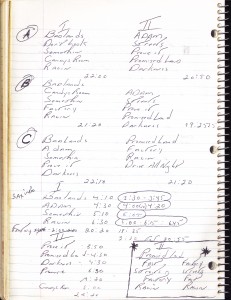 Dave Lifton: I was just skimming through my iTunes library and “Poor Places” by Wilco jumped out at me. I thought about how perfect it is as the second-to-last song on Yankee Hotel Foxtrot, simultaneously bringing resolution to the themes of the album but also how it sets up “Reservations,” the gorgeous closing song. Off the top of my head, I can only think of two others that do that as well: “Meeting Across The River” by Bruce Springsteen (Born To Run) and “Skyway” by The Replacements (Pleased To Meet Me). As much as I’m sure we’ve all talked about our favorite opening or closing songs over the years, has anybody ever thought about their favorite penultimate songs?
Dave Lifton: I was just skimming through my iTunes library and “Poor Places” by Wilco jumped out at me. I thought about how perfect it is as the second-to-last song on Yankee Hotel Foxtrot, simultaneously bringing resolution to the themes of the album but also how it sets up “Reservations,” the gorgeous closing song. Off the top of my head, I can only think of two others that do that as well: “Meeting Across The River” by Bruce Springsteen (Born To Run) and “Skyway” by The Replacements (Pleased To Meet Me). As much as I’m sure we’ve all talked about our favorite opening or closing songs over the years, has anybody ever thought about their favorite penultimate songs?
Matt Wardlaw: I’ll throw in two Del Amitri pairs, “The Ones That You Love Lead You Nowhere” and “Always The Last To Know” from Change Everything and “Crashing Down” into “It Might As Well Be You” from Twisted.
Dan Wiencek: I feel in a way that “Shelter From the Storm” is the real ending to Blood on the Tracks, tying back to “Tangled Up in Blue” with its epic scale and multi-layered narrative that could just as easily be several stories packed together as a single one. “Buckets of Rain” feels more like an epilogue, a simpler and more plain-spoken statement.
Lifton: Yeah, that’s how I thought about “Poor Places.” “Shelter From The Storm” is a perfect one, too.
Dave Steed: Ain’t no better penultimate song than “P.Y.T. (Pretty Young Thing)”
I do though love NIN’s “La Mer” on The Fragile, leading into “The Great Below” – however that’s the penultimate song on Disc 1 – so maybe that doesn’t qualify.
Robert Cashill Isn’t “Carry That Weight” on Abbey Road the ultimate penultimate? (Or would that be “The End,” if you consider “Her Majesty” a song?)
Lifton: I consider everything on Side 2 from “Sun King” on down to be one long song.
David Medsker: I don’t. “Mustard/Polythene/Bathroom” is one song. “Slumbers/Weight/End” is another. Then there’s “You Never Give Me Your Money,” which is only one song but feels like three.
Zack Dennis: “Acrobat” from U2’s Achtung Baby and “Lurgee” from Radiohead’s Pablo Honey were my favorite. But I’m a big fan of both albums, so it feels a little like I’m cheating.
Will Harris: A couple of my favorites:
The Smiths, “There Is A Light That Never Goes Out,” from The Queen Is Dead
Jellyfish, “Baby’s Coming Back,” from Bellybutton
And if you count “I’m Still Here” as merely an extension of “How Will You Know” (which I always have), then I submit “She Goes On,” from Crowded House’s Woodface.
Johnny Bacardi: While it’s not technically the penultimate song (there are a couple of remixes tacked on to the end, but I love this record so much I don’t care), “Feeling Yourself Disintegrate” from the Flaming Lips’ Soft Bulletin comes to mind.
Flashing back to my Elton blog, “Mona Lisas and Mad Hatters” from Honky Chateau is another. “You Are Here” from Lennon’s Mind Games is another longtime favorite track.
I bet I could go on for hours.
David Medsker: “Save a Prayer” from Rio, segueing into “The Chauffeur.”
Ken Shane: Making Movies by Dire Straits is one of my favorite albums. It seems to me that the album’s only flaw is the closing track “Les Boys” in that it just doesn’t seem to belong with the songs that preceded it. So I like to think of “Hand In Hand” as the album’s final track.
Wiencek: I agree, I never liked that song. But wasn’t “Solid Rock” the penultimate track?
Lifton: “Solid Rock” is a great penultimate song, but it’s undercut by “Les Boys,” which doesn’t connect to the rest of Making Movies in any way. Thankfully, it’s given a second chance on Alchemy, where it sets up “Going Home” quite nicely.
Medsker: Just thought of two more: “I Can’t Own Her” into “The Last Balloon” from XTC’s Apple Venus Vol. I. and “Faster Than Light” into “Addicted” from Neil Finn’s Try Whistling This.
Dw. Dunphy: Here’s a question: really good penultimate songs obviously come from really thoughtful album sequencing, but how much of that really happens? Frontloading an album with hits on the first side would indicate a major label hand in the process.
That would presume that the concern was with Side One on their part and that the rest was made to fall into place on its own. So, aside from those bands that are particularly meticulous about this stuff, in terms of “penultimate songs,” how much is labored and how much is serendipity?
 Lifton: I think it depends on the artist and their views on whether the album is a collection of moods and ideas or merely a Singles Delivery System. As the notion of the album as being more than singles-plus-filler began to take hold, sequencing became an important part of the listening experience. The albums The Rolling Stones put out from 1968-71 work that brilliantly, with “Monkey Man” into “You Can’t Always Get What You Want” (Let It Bleed) and “Dead Flowers” into “Moonlight Mile” (Sticky Fingers) serving that coda-plus-epilogue role. And in the replica of Springsteen’s notebook that’s included on the Darkness On The Edge Of Town box set, there’s a page (left) that shows him trying out a variety of sequences, so that was also clearly on his mind.
Lifton: I think it depends on the artist and their views on whether the album is a collection of moods and ideas or merely a Singles Delivery System. As the notion of the album as being more than singles-plus-filler began to take hold, sequencing became an important part of the listening experience. The albums The Rolling Stones put out from 1968-71 work that brilliantly, with “Monkey Man” into “You Can’t Always Get What You Want” (Let It Bleed) and “Dead Flowers” into “Moonlight Mile” (Sticky Fingers) serving that coda-plus-epilogue role. And in the replica of Springsteen’s notebook that’s included on the Darkness On The Edge Of Town box set, there’s a page (left) that shows him trying out a variety of sequences, so that was also clearly on his mind.
But as more and more singles began to get pulled from albums, I think this stopped being important to a lot of artists (or, more fairly, their labels). Then CDs replaced records and tapes as the dominant medium and created a new way of thinking about sequencing.
Kelly Stitzel: An interesting example of tracklisting changes because of record company input is Tori Amos’s From the Choirgirl Hotel. The intended order of the tracks is how they appear in the lyric booklet, but the record company insisted she rearrange it. Listening to the songs in the original intended order makes for a different listening experience and gives a different perspective to the songs.




Comments